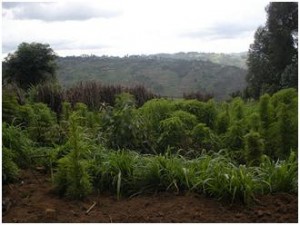Former President Bill Clinton established the William J. Clinton Foundation in 2001, and the organization has been working to fight childhood obesity, mitigate climate change, provide access to healthcare and treat HIV/AIDS, strengthen rural economies and alleviate hunger and poverty. The Clinton Foundation’s work in Africa focuses on bolstering income for smallholder farmers, increasing agricultural productivity, and alleviating poverty

The Foundation operates programs under the Clinton Development Initiative in both Rwanda and Malawi. In Malawi, smallholder, rain-fed farming supports almost 90 percent of the population. The national poverty rate is 52 percent, and most of the 12.3 million people live in rural areas with little access to health and educational services. Similarly, in Rwanda, nearly 90 percent of the population is engaged in agriculture, and the majority of people here live below the poverty line.
The Clinton Foundation has worked with and helped nearly 19,000 farmers in Rwanda and Malawi to improve soil quality to increase yields. Through the Foundation’s programs, farmers have been supplied with affordable fertilizer and better-quality seed, and have gained profit from high-yield fruit trees and establishment of a coffee collective.
In Rwanda, The Clinton Foundation has partnered with the Hunter Foundation to provide economic support and opportunities for farmers. The Clinton Hunter Development Initiative (CHDI) is identifying and developing large-scale businesses to stimulate demand for crops, working with farmers to ensure they get a fair price for their crops, and supplying local farmers with farm inputs. CHDI assisted the Rwandan government with the single largest purchase of fertilizer in Rwandan history. With the fertilizer, improved farming techniques and access to seeds, 4,000 farmers saw their yields increase by 240 percent on average. CHDI has also helped Rwandan coffee farmers develop a profitable enterprise in the Misozi Coffee Company. By providing coffee farmers with technical and marketing support and a $USD 23,000 loan, CHDI helped the farmers increase their sales by over 30 percent.
In Malawi, The Clinton Development Initiative, with funding from the Salida Capital Foundation, has launched two projects aimed at increasing farmers’ yields and incomes by providing them with access to inputs and markets. The Anchor Farm Project affiliates smallholder farmers with a 1,000-hectare commercial farm growing soy, maize and groundnuts. Through this project, farmers have access to better soy seed and to a domestic bulk buyer of soy. Furthermore, over 2 million trees have been planted by farmers through the Trees of Hope project. The fruit and hardwood trees provide additional income for the farmers.
By Dana Drugmand

Danielle Nierenberg, an expert on livestock and sustainability, currently serves as Project Director of State of World 2011 for the Worldwatch Institute, a Washington, DC-based environmental think tank. Her knowledge of factory farming and its global spread and sustainable agriculture has been cited widely in the New York Times Magazine, the International Herald Tribune, the Washington Post, and
other publications.
Danielle worked for two years as a Peace Corps volunteer in the Dominican Republic. She is currently traveling across Africa looking at innovations that are working to alleviate hunger and poverty and blogging everyday at Worldwatch Institute’s Nourishing the Planet. She has a regular column with the Mail & Guardian, the Kansas City Star, and the Huffington Post and her writing was been featured in newspapers across Africa including the Cape Town Argus, the Zambia Daily Mail, Coast Week (Kenya), and other African publications. She holds an M.S. in agriculture, food, and environment from Tufts University and a B.A. in environmental policy from Monmouth College.








